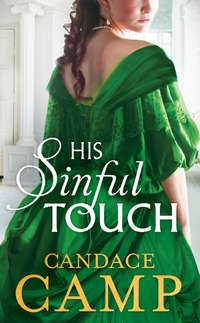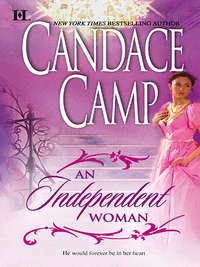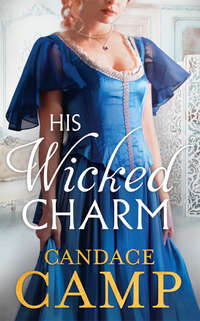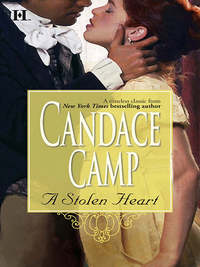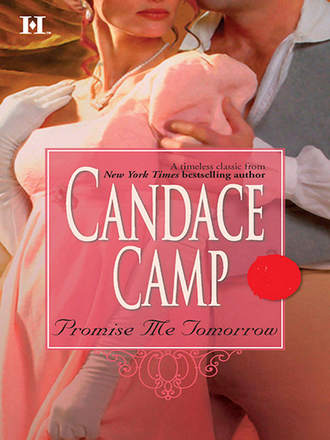
Полная версия
Promise Me Tomorrow
“Really, Penelope! Did you have to go on about those silly novels? One would think you could have made a little effort to impress Lord Lambeth.”
“Oh, Mama, Lord Lambeth has no interest in me,” Penelope replied, flushing with embarrassment. “I wish you would not say such things.”
Lady Ursula sighed. “Sometimes I quite despair of you, Penelope. Any other girl would have at least made a push to be appealing.”
“What nonsense, Ursula,” the Countess put in. “Lord Lambeth and Penelope would not suit at all. I wonder you can even think of such a match.”
“Would not suit? How could a marquess with a family back to the Invasion and barrels full of money possibly not suit?”
“I am sure I would not suit him, Mama. Everyone says he will eventually marry Cecilia Winborne, and even if he did not, well, I am sure that I am hardly his style.”
“Who a man flirts with and who he marries are two entirely different things,” Lady Ursula said pedantically. “Our family is as old and genteel as one could hope to find—the equal of Lord Lambeth’s and certainly better than the Winbornes, I should hope.”
Penelope gave up the struggle. She had found out long ago that it was useless to try to make her mother see reason. Her grandmother spoke quickly to forestall Ursula, who was gathering herself for another attack.
“Of course we are,” Lady Exmoor said. “Indeed, I wonder that you should think a Montford should marry an upstart like the Duke of Storbridge’s son.”
Ursula turned a startled gaze to her mother, then grimaced as she saw the twinkle in the Countess’s eyes. “Really, Mother, this is scarcely something to joke about.”
“I think it is precisely the sort of the thing to joke about. As if Penelope would want to marry Lord Lambeth. Do let us stop talking such nonsense.” She turned back to Penelope. “I have had a report from the Runner I set on finding Marie Anne.”
“Did he have any luck?” Penelope asked eagerly.
Lady Exmoor sighed. “Partially. I had told you that he found an orphanage outside London where a child named Mary Chilton had been taken, and it was the right time. When he went there, he found that the matron was retired, but one of her assistants still worked there, and she remembered the child. ‘Redheaded spitfire,’ was the way she put it.” A smile trembled on the older woman’s lips, and Penelope saw moisture in her eyes. “That sounds like Marie. He managed to worm out of them where the child went when she left the orphanage.”
The Countess paused and swallowed hard before she could continue. “She went into service at a local house.”
“Oh, no!” Penelope cried, reaching out and taking her grandmother’s hand. Lady Exmoor squeezed it hard, pressing her lips together to stop their trembling. “That’s awful! I mean, well, to think of my cousin having to scrub and clean.”
“Yes. For nobodies like those Quartermaines,” Lady Ursula added, her indignation roused by the slight on the family. “I’ve never even heard of them.”
“Local gentry,” Lady Exmoor explained. “Still, I don’t suppose it really matters who they are. The real problem is that she left there a few years later, and no one seems to know where she went. The trail just vanishes.”
“So that’s the end of it?” Penelope asked, disappointed.
“The housekeeper told him that she was friends with another maid. But that girl is gone from the house, too. The servants and family seem to be an unusually reticent lot. The Runner is inclined to think that there was perhaps some scandal involved in her leaving.”
Penelope’s eye widened. “This is terrible.”
The Countess sighed. “Well, at least the other man would have had no better luck, I guess. That’s the only bright side.”
“What other man?”
“There had been someone else at the Quartermaine house asking questions about Mary Chilton before my fellow came. The housekeeper remarked on it, wondering why so many people were suddenly interested in her.”
“And you think this other man is from—the Earl?”
Lady Exmoor’s mouth tightened. “I am sure of it. Who else would be looking for her? He knows I suspect him of having gotten rid of Marie Anne and Johnny—oh, if only that wicked woman had lived!”
Penelope knew to what woman her grandmother referred. It was her grandmother’s cousin and former companion, Willa Everhart. Recently, on her deathbed, Miss Everhart had confessed that twenty-two years earlier, she had conspired against the Countess to keep her grandchildren from her. During the dark days in Paris, after the storming of the Bastille, the Countess’s son, Lord Chilton, and his wife had been killed by the mob, who had mistaken them for French aristocrats. The reports that had come back to London had said that Chilton’s three children had been killed, as well. But in fact they had not died, but had been smuggled out of France and brought to London by an American friend of Lady Chilton’s, Rhea Ward. Mrs. Ward, lonely and unable to bear a child herself, had taken the baby, Alexandra, as her own and raised her in the United States, but she had brought the older two, John and Marie Anne, to the Countess’s home.
The Countess, prostrate with grief over the deaths of her son and the supposed deaths of his children, had taken to her bed and refused all visitors, so Miss Everhart had been the one who spoke to Mrs. Ward and took the two children from her. Mrs. Ward then left the country, thinking the children safe with their grandmother, but Miss Everhart had played the Countess false. Desperately in love with Richard Montford, the distant cousin who had become the Earl of Exmoor upon the death of Chilton and the supposed death of his son John, the true heir, she had taken the children to Richard instead. The existence of the boy John, she knew, would mean that her lover would lose the title and estates, and she counted on his gratitude for what she had done to tie him to her. The boy, Willa had told them as she lay dying, had been very sick with a fever and had died. The girl Marie, however, had been taken to an orphanage.
The Countess had immediately hired a Bow Street Runner to investigate Marie’s whereabouts, but she had realized that there was little she could do about Richard’s treachery. Willa had died immediately after telling them her story, and they had no proof or witnesses to show that the present Earl of Exmoor was the villain they all knew he was. He, of course, had denied the story and claimed that Willa was a madwoman who had undoubtedly acted on her own—if there was any truth to the story in the first place. Since the boy John was dead, even though not at the time or place they had thought, Richard was still the legal holder of the title. To accuse him of kidnapping the children and murdering John, as the Countess suspected, would do nothing but involve the family in an enormous scandal.
“But why would Richard be searching for her?” Lady Ursula asked, puzzled. “Richard doesn’t give a whit about her. I would think he would just as soon she stayed lost.”
“I am sure he does,” the Countess agreed dryly. “I think it is precisely for that reason that he is searching for her—to make sure she stays lost.”
Penelope sucked in a startled breath. “You mean…you think that he will kill her?”
“It’s not something I would put past him. I am sure he is desperate to maintain the lie that he has lived all these years. At the very least, he will put her on ship and send her off to America or India or some other remote place where I cannot locate her. She was five when it happened, after all. There might be some hope that she would remember what happened to her—or who had turned her over to the orphanage. She might even remember what happened to her brother.”
“Oh, my. I certainly hope that he doesn’t find her, then. Is there nothing further we can do?”
“Mr. Garner—that is the man whom I hired—says that he will try to track down this friend of Mary Chilton’s, Winny something-or-other. The housekeeper did know that she moved to London, though no one had any idea where she lived. Another one of the maids was friends with her but told Garner that she did not know where this Winny was now—even after Garner offered her money. But even if he finds the friend, I hold little hope that she will know where Mary Chilton is. After all, it has been over nine years since Mary left the Quartermaine house.”
None of what she had told them sounded good, Penelope thought, but she tried to put the best face on it that she could. She patted her grandmother’s hand. “Don’t worry, Grandmama. I am sure she will turn up just as Alexandra did. We Montfords are a trifle hard to do away with, you know.”
Lady Exmoor smiled at her. “Thank you, dear. I am sure you are right. We will find her.”
“Let us only hope it is before Richard does.” Lady Ursula, as always, had to have the last word.
MARIANNE LAID DOWN HER CARDS WITH a sigh. “You win—as usual, Betsy.”
“Hmmph.” The old lady narrowed her eyes. “It was easy enough. What’s bothering you, child? You played even more poorly than you normally do.”
Marianne smiled a little ruefully. “Nothing. It is just anxiety…not knowing, you see, whether Lord Lambeth will forget about me or go to the authorities. I don’t like this inactivity.”
In truth, she knew it was more than that, though she did not want to tell Betsy about her vague insecurities. The odd letter from Winny’s friend had disturbed her more than she cared to admit. Over the past few days, her thoughts had kept returning to it. What could this stranger want with her? It had stirred up memories, too, things from her days at the orphanage and at the Hall that she would just as soon forget. She kept thinking of that day when Daniel Quartermaine had cornered her in his bedroom as she was dusting his room, of the way he had begun to kiss and caress her, not letting her go when she told him no. She had finally begun to struggle, frightened, and it was then that he had slapped her and thrown her down on the floor beside the bed. His eyes had lit with a fierce, wild glow that she had not seen there before, and it had terrified her. She remembered the fear and disgust as his hands had moved over her and his tongue had thrust deeply into her mouth.
She could not help but think how differently she had felt the other night when Lord Lambeth kissed her, how her whole insides had turned to melting wax and her blood had hummed in her veins. Lambeth would have turned to force, too, if he had had the chance, she told herself. He was, after all, even more arrogant than young Quartermaine. No doubt he, too, thought that all women ought to feel honored to receive his advances. It did not mean anything that he had released her when she pulled away, or that he had not made a move toward her when she slapped him. It had been merely surprise that she would oppose him that had kept him rooted to the spot.
She remembered his golden eyes darkened with lust, his well-cut lips sensually full and soft, and she felt again that clenching deep in her loins that was both delightful and dissatisfying. It annoyed her that she continued to think about him.
Worse than the thoughts that had been plaguing her, however, was the strange sensation she had felt yesterday as she was walking home from the lending library, where she had gone to return the book she had borrowed two days earlier. As she strolled along, she had begun to have the oddest feeling at the base of her neck. She had stopped and turned, but she saw nothing out of the ordinary, just another person or two walking along as she was. All the way home, she had been unable to get rid of the impression that someone was watching her. Feeling foolish, she had looked around again, but this time there had been no one on the block but her. Still, thinking about the tingling along her spine made her want to shiver.
“Mrs. Cotterwood.” One of their two maids stood hesitantly at the door. “There’s someone here to see you. I—he’s in the foyer.”
Marianne looked at her, surprised. No one ever came to visit her. She eschewed any sort of intimacy with the Society flats. It occurred to her now that a visitor was so rare that the maid wasn’t even sure what she should do with the fellow.
“Thank you, Nettie.” She rose, glancing over at Betsy, who looked back at her with as much puzzlement as Marianne felt. Had the man who had been inquiring after her at the Hall managed to find her? Was it he watching her yesterday when she had felt those odd sensations?
Suppressing her fears as best she could, Marianne rose and went out into the hallway. She stopped cold when she saw the man standing in the foyer, hat in hand, smiling down at her daughter.
Lord Lambeth had found her.
CHAPTER FIVE
“MY LORD,” MARIANNE SAID FAINTLY.
Lambeth looked up at Marianne and smiled, a faintly vulpine curving of his lips that seemed as much a warning of danger as a greeting. “Mrs. Cotterwood.”
“Rosalind, what are you doing here? I thought you were in the kitchen with Winny, working on your studies.”
“I came out to see who was here, Mama,” Rosalind replied pragmatically. “Nettie came into the kitchen and said, ‘Lor’ but there’s a ‘andsome devil out there.’ So I wanted to see.”
Lambeth chuckled. Marianne couldn’t see that the disclosure discomfited him much. He probably expected everyone to find him handsome.
“But he doesn’t look like a devil to me,” Rosalind went on seriously.
“Bless you, child.” Lambeth grinned. “Just for that, I’ll take you up with me one of these days in my curricle.”
“Would you?” Rosalind turned to him, eyes sparkling. “Where everybody could see?”
“Indeed. What would be the point otherwise?”
A sunny smile spread across her daughter’s face. “I’d enjoy that ever so much.”
“Rosalind, I think it’s time you went back to your studies, don’t you?”
“Yes, Mama.” She turned and started away, then turned, asking Lambeth gravely, “You won’t forget, will you?”
“I swear it.” Lambeth laid his hand over his heart dramatically.
Rosalind grinned and skipped away. Marianne watched the child leave, then turned back to Lambeth, irritated at the easy way he had won her daughter over.
“How did you find me?” she asked bluntly.
His eyes lit with laughter. “Were you hiding from me?”
“Of course not.” Irritation stiffened her spine. “But I gave you no permission to call on me.”
“I know. I am far too bold. I’ve been told so before. However, I felt sure that if we had not been so rudely interrupted, you would have given me your direction.”
“You take rather a lot upon yourself.” This was an awkward situation. If they were to stay in London, as the others wanted, she needed somehow to deflect this man’s suspicions. She could not simply turn him away, for that would only increase his doubts about her. But she knew that if he were to meet any of her supposed family, it would likely do the same thing. While most of them spoke rather genteelly, she knew from being around the ton that they would not pass any discerning eye—and this man’s eyes were more discerning than most.
“I felt sure I could depend on your good nature.” Lambeth’s eyes were laughing at her again, and Marianne felt as though she could cheerfully shove him out the front door. It was especially irritating that the twinkle of those sherry-colored eyes made her insides jangle in a most disturbing way.
“Won’t you come in, then?” she asked, assuming as gracious a voice as she could muster, and extended her hand toward the front drawing room, the most formal room in the house. She spared a glance toward the sitting room, which she had just left, and caught sight of Betsy’s curious face peering around the door.
She closed the door to the drawing room behind them. It was a thoroughly indelicate thing to do, and God knew what Lambeth would think of her for it, but she hoped that the closed door would send a message to the rest of the “family” to stay out.
“Now, would you tell me why you came here?”
“Why, to see you. Why else?”
“I don’t know. That’s why I asked. I though perhaps you came to renew your absurd allegations.”
“My dear girl.” Lambeth put on a wounded expression as he took her hand in his and raised it to his mouth. “I came to apologize for offending you.”
His lips brushed her skin like velvet, and Marianne felt it clear down to her toes. She struggled to keep her breathing even. “A note would have done as well.”
“Ah, but then I would not have had the pleasure of looking at you while I threw myself on your mercy.”
“Don’t talk nonsense. I don’t think you are in the slightest sorry.”
“Indeed, I am. I am very sorry that you slipped away last night before we had finished our conversation.”
“There was nothing further to say. Somehow you got the wrong impression of me, and I don’t know how I can change your mind.”
“I would not be at all averse to your trying.”
“Lord Lambeth, you are very presumptuous.” He was still holding on to her hand, and it took some effort for her to pull it from his grasp. She walked away from him, sitting down in a chair and gesturing him toward the sofa opposite her.
“Mmm. No doubt. I have found that it usually serves me well.” Lambeth took the chair beside her instead.
“Was it you following me yesterday?” she asked bluntly.
“No, I assure you.” He smiled. “I knew that if you saw me you would flee immediately. I sent one of my servants instead—and a cursed clumsy job he must have made of it if you spotted him.”
“I didn’t spot him. It was just a feeling.”
“I apologize if he alarmed you.” His voice sounded sincere, and Marianne felt unwillingly warmed by it. “I wanted very much to see you again—that is my only excuse for such behavior. You say that I got the wrong impression of you the other night at Lord Batterslee’s. I fear that you received the wrong impression of me, as well.”
Конец ознакомительного фрагмента.
Текст предоставлен ООО «ЛитРес».
Прочитайте эту книгу целиком, купив полную легальную версию на ЛитРес.
Безопасно оплатить книгу можно банковской картой Visa, MasterCard, Maestro, со счета мобильного телефона, с платежного терминала, в салоне МТС или Связной, через PayPal, WebMoney, Яндекс.Деньги, QIWI Кошелек, бонусными картами или другим удобным Вам способом.


